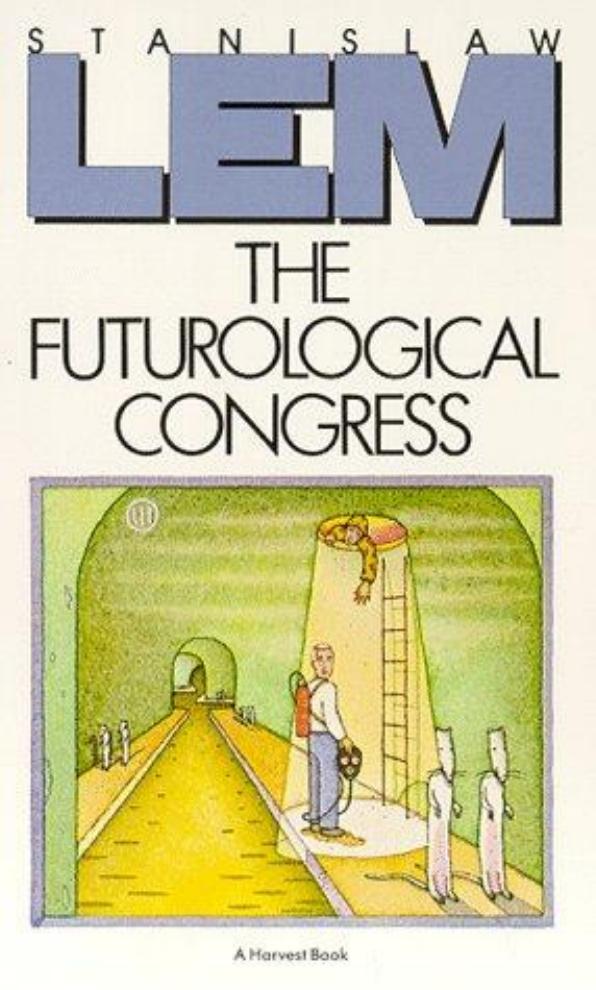The Futurological Congress: From the Memoirs of Ijon Tichy by Stanislaw Lem

Author:Stanislaw Lem [Lem, Stanislaw]
Language: eng
Format: epub, pdf
Publisher: HMH Books
Published: 1985-10-28T04:00:00+00:00
3 IX 2039. I was at my lawyerâs. He saw me personally, which is a rare honor; usually the clerk machines handle the clients. Counselor Crawley received me in an office furnished with all the usual imposing legal paraphernalia, ornate cabinets, shelves packed with deeds and documentsâstrictly for show, of course, since now everything is recorded on magnetic tape. On his head he wore a mnemonor, an auxiliary memory, a sort of transparent pointed cap inside which the currents danced like a cloud of fireflies. The second head, smaller and looking like a much younger version of the first, stuck out from between his shoulder blades and softly spoke into a telephone the whole time I was there. One of those detachables. He asked me what I was doing with myself and was quite surprised to hear that I didnât intend to travel overseas. When I told him that after all I had to watch my money he appeared even more surprised.
âBut you can always get what you need from the giveaway,â he said.
As it turns out, all one has to do is go to the bank and write out a receipt, and the cashier (at the giveaway counter) hands over the desired amount. Itâs not a loan eitherâwithdrawal of the sum carries with it no obligation whatever. True, there is a catch. Return of the money is not required by law but rather left up to oneâs own conscience. And one can take as many years as one likes to pay off the debt. But what keeps the banks from going bankrupt, I asked, if the borrowers donât have to honor their debts? Again he was amazed at my innocence. I keep forgetting that we live in an era of psychem. Letters containing gentle reminders about accounts outstanding and amounts owed are saturated with a volatile substance which rouses oneâs sense of responsibility, oneâs scrupulousness, and also oneâs desire for gainful employment. In this way the giveaway never operates at a loss. Of course there are a few dishonest individuals who hold their noses upon receiving the mailâbut then every age has its deadbeats. Recalling the recent physivised discussion about the penal code, I asked him whether this psychemical impregnation of letters might not constitute a felony under paragraph 139 (whosoever employs psychem to influence persons, be they actual or actuarial, without their knowledge or consent, is subject to arrest etc., etc. . . .). My remark seemed to please him. He began to explain the subtle nature of the situationâthe giveaway may pursue its claims in this manner, for if the recipient of the letter is in fact solvent and without creditors, he can experience no guilt, and the desire to work more diligently than before is from the point of view of society a commendable thing. The lawyer was most courteous; he invited me out to dinner. At the âBronx,â September ninth.
Returning home, I concluded that it was high time to acquaint myself with the outside world and not rely exclusively on the reviewer.
Download
The Futurological Congress: From the Memoirs of Ijon Tichy by Stanislaw Lem.pdf
This site does not store any files on its server. We only index and link to content provided by other sites. Please contact the content providers to delete copyright contents if any and email us, we'll remove relevant links or contents immediately.
Sita - Warrior of Mithila (Book 2 of the Ram Chandra Series) by Amish(54839)
The Crystal Crypt by Dick Philip K(36847)
Cat's cradle by Kurt Vonnegut(15320)
Always and Forever, Lara Jean by Jenny Han(14879)
Ready Player One by Cline Ernest(14630)
The Last by Hanna Jameson(10241)
Year One by Nora Roberts(9775)
Persepolis Rising by James S. A. Corey(9343)
The remains of the day by Kazuo Ishiguro(8962)
Never let me go by Kazuo Ishiguro(8863)
Red Rising by Pierce Brown(8745)
Dark Space: The Second Trilogy (Books 4-6) (Dark Space Trilogies Book 2) by Jasper T. Scott(8164)
The handmaid's tale by Margaret Atwood(7747)
The Circle by Dave Eggers(7098)
Frank Herbert's Dune Saga Collection: Books 1 - 6 by Frank Herbert(7049)
The Testaments by Margaret Atwood(6874)
Legacy by Ellery Kane(6644)
Pandemic (The Extinction Files Book 1) by A.G. Riddle(6520)
Six Wakes by Mur Lafferty(6229)
